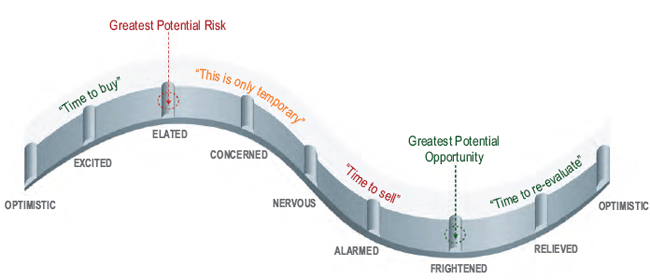The Challenge of Emotion
How you manage emotions and stay focused can have a significant impact on your financial future.
We believe that investor emotions can play a major part in the success or failure of an investment portfolio as well as the overall wealth plan.
For most of us, money is bound up with powerful emotions such as security, confidence and even, sometimes, fear. But the emotions of investing can cause you to lose focus on important areas of your financial life, most of which have absolutely nothing to do with the stock market.
We know that remaining patient and disciplined can be extremely difficult, especially when stocks or other assets are soaring or plummeting. The way our brains are hard-wired can cause us to make emotional decisions about our money at precisely the wrong moments.

As the Cycle of Market Emotions chart above illustrates, many investors tend to “buy high” and “sell low.” Markets are sometimes prone to sharp and erratic movements, which can precipitate panic and cause investors to sell at inopportune times. Conversely, during a strong bull market, investors often rush into the market because they feel “elated” and buy at the peak.
Ultimately, this kind of emotional, short-term behavior can have detrimental consequences, including dramatic portfolio underperformance.
Moving in and out of markets and asset classes can result in investors missing those relatively small number of days when markets soar unexpectedly. It’s therefore vital that you stick to your plan — especially during periods when the financial markets are behaving in extreme ways.
Moving in and out of markets and asset classes can result in investors missing those relatively small number of days when markets soar unexpectedly. It’s therefore vital that you stick to your plan — especially during periods when the financial markets are behaving in extreme ways.
The impact of being out of the market for a short time can be profound, as shown by this hypothetical investment in the Russell 3000 Index, a broad US stock market benchmark.
A hypothetical $1,000 investment made at the beginning of 1999 turns into $6,449 for the 25-year period ending December 31, 2023.
Miss the Russell 3000’s best week, and the value shrinks to $5,382. Miss the best three months, and the total return falls to $4,546.
There’s no proven way to time the market— targeting the best days or moving to the sidelines to avoid the worst.
Staying invested and focused on the long term helps to ensure that you’re in position to capture what the market has to offer.

Please note that the fact that buy-and-hold has been a successful strategy in the past does not guarantee that it will continue to be successful in the future.



